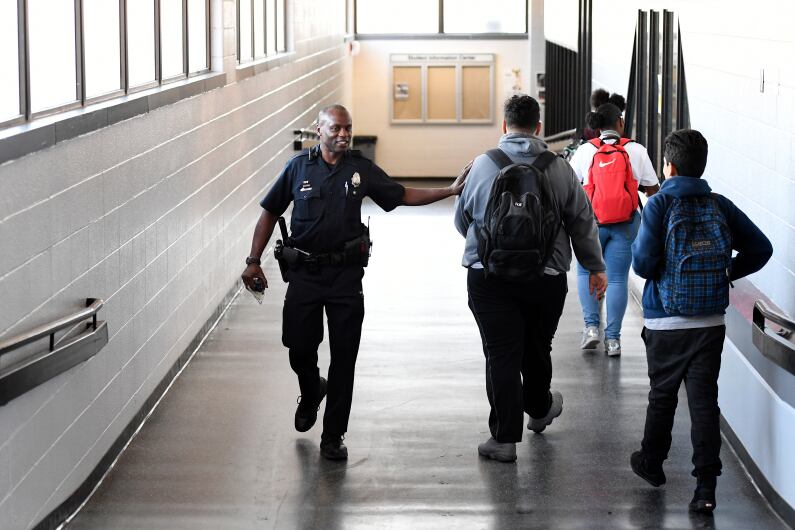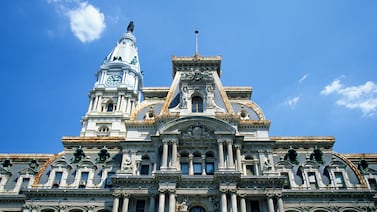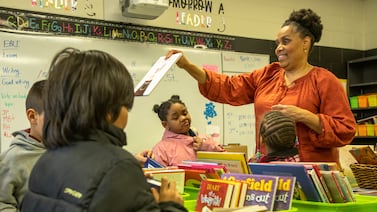In the week before the Denver school board voted on removing police officers from schools, Superintendent Susana Cordova said she’d heard from educators across the district — some who supported the move and others who did not.
“I know that there is a wide diversity of opinion on this and lots of people have been writing in, both strongly in favor, as well as expressing many concerns,” Cordova said earlier this week.
“Regardless of where you sit on that continuum, what I do want to assure all of our principals, all of our parents, is that at all times, we will have the best interest of our students at heart.”
The push to remove police officers from schools comes from school board members, community activists, and many students who point to disparate treatment of Black students.
Chalkbeat obtained through an open records request emails sent by Denver Public Schools educators to Cordova on the topic of school resource officers, the specially trained officers who are stationed full-time on 18 middle and high school campuses.
The emails provide a window into educators’ experiences with police. While several praised the role school resource officers play, others said they don’t belong in schools. Still others reported traumatizing experiences with officers not trained to work in schools.
We’ve excerpted some of the emails below.
Adia Berry, teacher, McGlone Academy
I remember my first time experiencing police in school.
This happened at my current school, McGlone Academy, in [the] 2015-2016 school year. … One day, we hear loud noises coming from the fifth grade classrooms. We hear a student yelling and teacher yelling just as loud and even angry.
We see the police come in the back doors nearest to the classroom where this was happening. … After about 20 minutes we see a Black student — very popular, charismatic, and though I didn’t work with him at the time, I knew he was a student with a social emotional disability — being led with his hands behind his back in handcuffs, by a police officer and his teachers.
I remember it as if I were watching a movie. I couldn’t believe this was happening, at my school, in front of my students as they were learning. Needless to say they were not all right.
In the next special education meeting, I brought this up. I was accused of being “confrontational” and “aggressive.” As a Black woman, I’m not surprised by what I heard. I left the meeting and we as a school did end up making strides to eliminate police presence in our schools for disciplinary issues. A step.
It’s time to end our contract and ties to [the Denver Police Department]. I stand in solidarity with the Black Lives Matter movement. It’s time to end police violence in and out of our schools.
Antonio Esquibel, principal, Abraham Lincoln High School
I grew up in [southwest] Denver, specifically the Lincoln neighborhood and graduated from [Abraham Lincoln High School] in 1989. I have seen and experienced how the system does not provide for access, equity, and equality. I have relatives and friends who have experienced firsthand the racist policies and practices that have prohibited many from educational and societal success. Being a Chicano means something to me and my community.
At Abraham Lincoln, Officer Richard Blea plays a vital role, and as school leader, I am in support of him, knowing that revised training must be done in light of current issues and challenges with the police department. I am not comfortable with relying solely on DPS campus security officers for security and safety.
Andrew Hernandez, teacher, Bryant-Webster Dual Language School
I have primarily taught Black, Brown, and Native students while at DPS. And it has long been clear to me that they do not find safety or security when DPD — uniformed or otherwise — are in our schools. Many have told me that they have difficulty concentrating when they know the police are in the building, even if there is not an emergency. I have also seen my own students — elementary schoolers — handcuffed and paraded out of the building.
Such behavior exacerbates the trauma that many of our students of color already have in relation to uniformed officials. Further, these actions make their jobs as students, and my job as a teacher, all the more difficult, as they take us away from our academic work.
Scott Wolf, principal, North High School
When we have safety situations that require us to work with police at North, students and families are supported much better by our SRO in [the] building because she knows our community than when she is not present and we call DPD to have officers respond.
I am more concerned about families and students not being supported as well if SROs are removed from schools. In addition, SROs bring back perspective to DPD at the school level that would be lost if they are no longer in our buildings working with our youth.
Anders Benson, teacher, Denver Montessori Junior Senior High School
My students — particularly my Black, Indigenous, and students of color — continually express feeling unsafe in our school environment when police are present. How can students build meaningful learning partnerships and relationships with teachers and peers while they are experiencing these day-to-day traumas?
We remember the calls from Parkland students to not turn our schools into prison-like spaces. To continue this relationship would be to further justify brutal acts of violence upon the school community, and to further impede students’ learning, while creating traumatic events.
Bobby Thomas, principal, South High School
This is a difficult email to send considering what is currently happening within our country, and also how I have been personally targeted as a person of color by police outside of school settings both as an adolescent and as an adult.
In my 20-plus years of education, I have many examples of where SROs must be a part of secondary schools. They are trained and they play a vital role in community engagement. They help many students of color understand that not all police are racist or profile people of color. In fact, many of the SROs I have worked with have been Black or Brown. They talk with students and build relationships based on similar experiences they had growing up where they also were targeted by police. In fact, they became police because of negative encounters they had.
When safety situations arise within school settings and the SRO is not in the building, responding officers show up with a chip on their shoulder and treat not only students but the school personnel as if we are an inconvenience for calling dispatch or 911. In fact, I have had to file reports of discrimination against DPD and responding police because of how they treated staff and students. This has never happened with an SRO I worked with.
Shane Knight, principal, Knapp Elementary School
In my seven years at Knapp, I have seen DPD officers in my building nearly every week making
positive connections with kids. Officers eat lunch with students, dance, play soccer and four-square at recess, give high-fives, allow kids to sit in their squad cars — in the front seat, behind the wheel.
I’ve seen officers sit with me and a parent with active warrants [and] help the parent find resources so he doesn’t abuse his wife. I’ve seen officers help counsel parents on how to help their middle school son separate from the gang he’s begun to join. I’ve seen officers deliver news that a parent has died in a car accident. I’ve had officers call me to help a parent who has been in a fight in a McDonald’s parking lot.
Not once have I seen an officer threaten the use of force with a student or parent regardless of the situation. Just this spring I met with DPD leaders seeking ways to open communications with community members who have great fear of deportation.
If we as leaders in DPS seek to change the nature of the relationship between the Denver Police and our students, then we must lead by example – we must build bridges rather than erect walls. Only by nurturing a collaborative relationship can we humanize one another. Only when we see the “other” as a human can we begin to understand the “other.”







